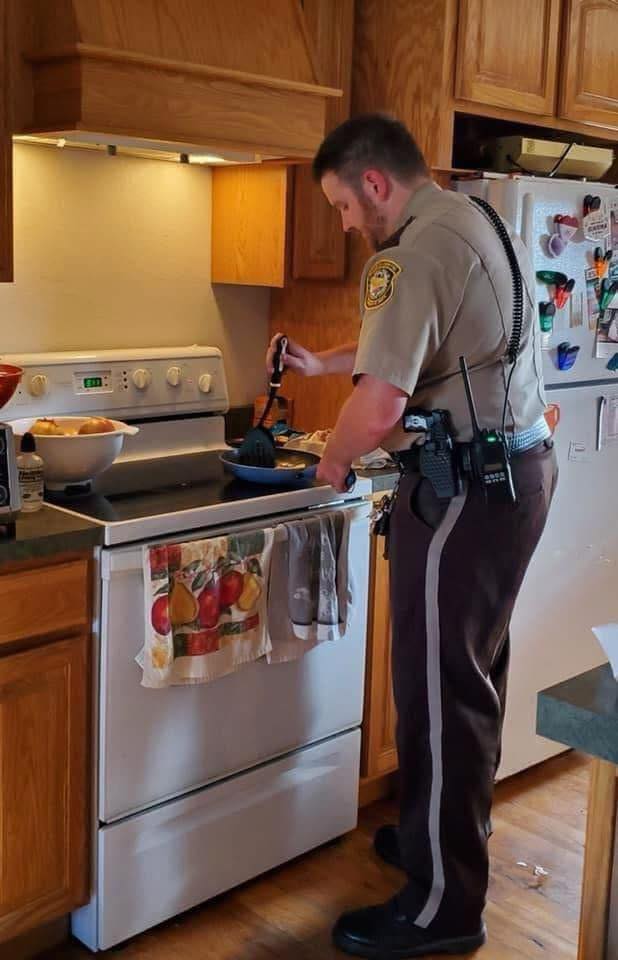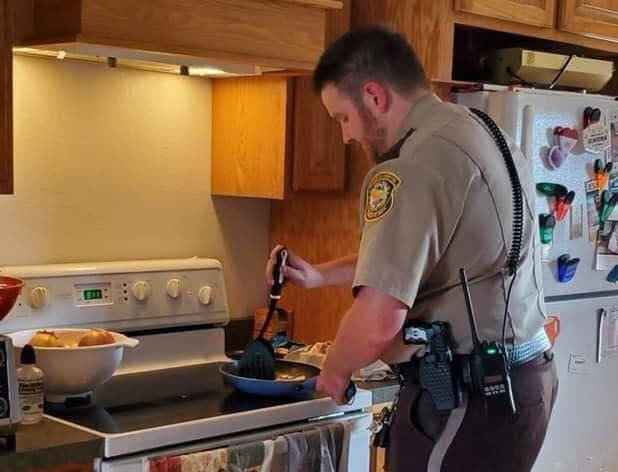I received the call at 3 p.m, it was simply a normal well-being check. The neighbour hadn’t seen Miss Evelyn in a few days, and she normally sat on her porch by now. I was not anticipating anything out of the usual. Most of these calls finish with a courteous wave and perhaps a suggestion to check in with family.

But when I knocked, she waited a good minute to get to the door. The first thing I noticed was how skinny she appeared—as if she hadn’t eaten for weeks. Her apartment had a slight fragrance of dust and something more, maybe vacant.
I asked the typical questions—was she okay, did she need help?—but she kept shrugging them off. Said she was ok. Still, something seemed odd. So I respectfully enquired whether she’d eaten lunch yet. She smiled but did not respond, only pointing to the kitchen.
There was not much to point at. A few stale crackers, one can of green beans, and some leftover bread. That was it. No fresh meals or goods. My stomach plummeted just then.
Technically, my task was over. She was alive and in no imminent danger. But walking away seemed wrong. So I told her I’d be back in 20 minutes.
I dashed to the local grocery shop and purchased some necessities—eggs, bread, soup, fruit, and even a little chicken. When I stated that it was not for me, the cashier gave me a strange look. It didn’t matter. I drove back, laid the bags on her counter and asked if she mind if I used her stove.
She sat quietly at the kitchen table, almost as if she couldn’t believe what was occurring. I started scrambling eggs and cutting up fruit. I handed her a dish, and she finally spoke.
But, what did she say next? That’s the bit I still can’t get over.
When she gazed down at the dish, which had freshly scrambled eggs and colourful slices of melon, her eyes welled with tears. “Nobody has cooked for me since my spouse died,” she muttered. She hesitated, clearing her throat as if she had said too much. “That was three years ago. I became used to doing things on my own.
Her words silenced me. Her tone conveyed both casualness and desire. I sat down across from her and enquired whether she had any children or close friends around. She shook her head, as if the concept itself was ridiculous. “They all have their own life,” she explained. “You know how it happens.”
We sat in quiet for a while. She picked at her eggs, reluctant to eat in front of others. I demanded she eat the food while it was still hot, and then I promised to clean up the kitchen. As I strolled throughout her little house, I observed minor reminders of a once-fulfilling life: a dusty wedding image on a side table, a crocheted blanket neatly arranged on the couch, and an ancient record player in a corner. The entire room felt frozen in time, as if she hadn’t entirely escaped from it.
After she finished eating, I cleared the dishes and asked whether she needed anything else before leaving. She thanked me so gently that I nearly missed it. I offered her my contact card, which we retain for community outreach, and indicated that she may phone the station at any moment. She simply smiled, without saying yes or no.
I left that afternoon with a strain on my heart. I had completed the well-being check and then some, yet it seemed unfinished. Over the next few days, I became preoccupied at work, wondering if Miss Evelyn had eaten. On the third day, I decided to stop by during my lunch break. I wasn’t sure if this was really “in my job description,” but it seemed appropriate. When I got to her house, I softly knocked. She responded slowly like previously, but this time with a tiny grin on her face. “Officer, you definitely like to stop by,” she joked.
I shrugged. “Just checking in to see how my favourite cook is doing,” I said, half-joking. In reality, I had brought groceries again, along with a few homemade biscuits I had cooked the night before. We sat down and talked—real discussion this time. She told me about how she and her husband used to manage a little floral shop downtown, how they had no children of their own but enjoyed having neighbourhood gatherings. After her spouse died, her world became quieter. The neighbours who used to drop by have either moved away or become elderly. The newcomers to the region were not unpleasant, but everyone was busier these days. Nobody knew her well enough to check on her. She eventually started keeping to herself.
“It’s my own pride, too,” she acknowledged, looking down at her hands. “I should have sought for help, but it’s difficult… “Especially when you’re used to being the one who assists everyone else.”
Her remarks struck a chord with me. I thought about how frequently we forget that strong, independent people may suffer in quiet. It reminded me of my grandmother, who refused to use a walker even though it would have prevented her from collapsing. Sometimes pride isolates us more than we realise.
One afternoon, I decided to do something modest yet profound. I asked her if she wanted to join me for a brief drive to the local community centre. She hesitated briefly before nodding. I got her into my patrol car (she thought it was hilarious to ride up front like a constable), and we drove across town. The centre was throwing a free luncheon for seniors, which I thought would be a fantastic opportunity for her to meet new people. She was apprehensive at first, hanging back near the entrance with her arms crossed. But a pleasant volunteer approached Miss Evelyn, introduced herself, and led her inside as if they were long-time friends.
I observed from a distance as she gradually warmed up, conversing with others who shared her experiences—stories of feeling alone, losing a spouse, or simply being left behind by life’s unrelenting speed. By the time we left, she had a few new phone numbers in her bag, as well as a pledge to return for their next event.
I kept an eye on her throughout the next few weeks. Sometimes I’d stop over with a package of goods. Other times, I just brought conversation, offering amusing tiny updates about my day or news from around town. Each time, I found her in a better mood. She continued to sit on her porch, but now it was to wave at neighbours, welcome them, and water a few potted plants she’d managed to revive.
A slight alteration occurred within her house as well. She replaced the old crackers with fresh ones, kept fruit on the counter, and even experimented with new recipes using a cookbook that the community centre had given her. Her once-dusty shelves now house new treasures, such as a painted rock from a neighbourhood youngster and a little plaque from the community centre that stated, “It’s never too late for fresh beginnings.”
Then one day, Miss Evelyn did something very unexpected. She added that she had an attic full of old picture albums and souvenirs. “I’d love to browse through them,” she explained, “but my knees are bothering me. “Do you mind?” I consented, and together we dug up boxes of pictures, letters, and even a fading journal from her high school years. She giggled at the outfits, absurd haircuts, and passionate scribbles of decades past. I noticed her face light up in a manner I had never seen before. It was as if she had discovered a piece of herself that she believed had vanished forever.
She gave me a cup of tea downstairs, and we sat at her tiny table, browsing through photos of birthdays, anniversaries, and Christmas celebrations. Seeing her surrounded by those memories made me realise how important this simple link was for her—and for me. It reminded me that everyone, no matter how modest or humble, has a rich life narrative full of pleasures and losses, great events and small victories.
By the end of that visit, I knew I’d be returning, no matter what. This was no longer simply a responsibility, but a friendship. I felt a responsibility to let her know she wasn’t alone, and by doing so, I found myself feeling less alone as well. Maybe that’s the odd thing about service: we frequently benefit just as much from giving as the recipient.
A month later, I went by on my day off. Miss Evelyn welcomed me with a smile, sporting a new cardigan and a home that smelt slightly of freshly cooked muffins. Her table had a modest bunch of flowers in a mason jar. “From the community centre, ladies,” she announced proudly. “When I informed them I used to be a florist, they asked I build a little arrangement for my house.”
I realised then that her spirit, which had been subdued by loneliness, was beginning to bloom anew. As we sat down to eat the muffins, she looked to me with bright eyes and said, “You know, you saved my life in more ways than one.” I attempted to dismiss it, but she would not allow me. “Not with sirens or theatrical heroics,” she said. “But simply by noticing, caring enough to remain when you didn’t have to.”
That reminded me of the day I first knocked on her door. I remembered the emptiness of her kitchen, the silence in her gaze, and the feeling that something was extremely wrong. And for a little time, I felt grateful that I had decided to stay. Because, sometimes, all it takes is a willingness to see someone else’s pain and create place in your life for them.
Miss Evelyn’s tale taught me something I’ll never forget: we don’t always need to tackle large, complex problems to make a difference in someone’s life. We only need to pay attention. The folks who declare they’re “fine” are frequently those who require the greatest assistance. It is our responsibility—and even privilege—to ensure that they are not neglected.
Finally, I learnt that kindness may take many different forms. A simple shopping run, a talk over tea, or a transport to a community meal can completely change someone’s life. It can help children overcome their feelings of loneliness and remind them that they are important. And, in doing so, it might remind us that we, too, matter—that every act of kindness links us in ways we may not see right away, but that are undoubtedly present.
If Miss Evelyn’s experience teaches us anything, it’s that checking in on one another has genuine power. So, if you haven’t seen someone in a while an old neighbour, a quiet buddy, or even a busy colleague, consider reaching out. A polite knock on the door and a helping hand might sometimes be enough to remind someone that they are not alone.
Thanks for reading our story. If you found it touching or motivated you to think about someone who could need some companionship, please share this post. You never know whose life you’ll improve by sharing the word. And while you’re at it, give it a like—together, we can keep the spirit of compassion alive.


